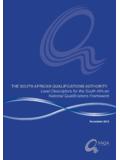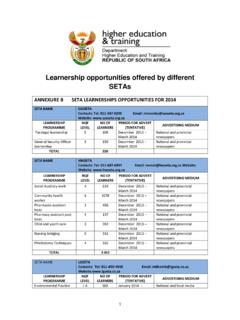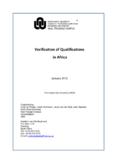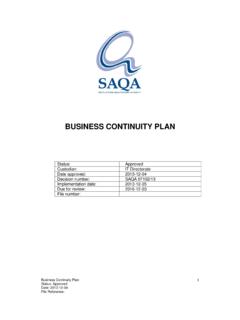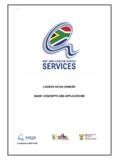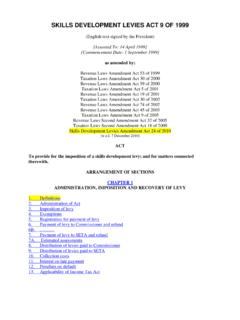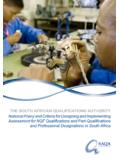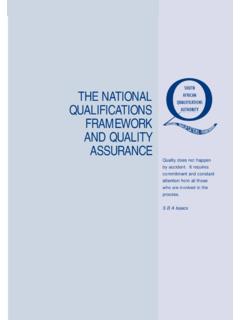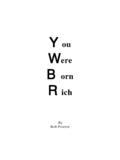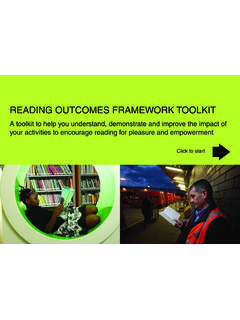Transcription of THE SOUTH AFRICAN QUALIFICATIONS AUTHORITY …
1 THE SOUTH AFRICAN QUALIFICATIONS AUTHORITY2018 Chairperson s LectureVocational versus occupational QUALIFICATIONS : Is there a difference , and does it make a difference ?Professor Volker WedekindDisclaimerThe views expressed in this publication are not necessarily those of the SOUTH AFRICAN QUALIFICATIONS AUTHORITY (SAQA) and only those parts of the text clearly flagged as decisions or summaries of decisions taken by the AUTHORITY should be seen as reflecting SAQA rights reserved. No part of this publication may be reproduced, stored in a retrieval system, or transmitted in any form or by any means, electronic, mechanical, photocopying, recording, or otherwise, without the prior written permission of the SOUTH AFRICAN QUALIFICATIONS AUTHORITY (SAQA).AcknowledgementsSAQA gratefully acknowledges Professor Volker Wedekind for delivering the 2018 SAQA Chairperson s lecture , and for the contents of this booklet.
2 The booklet was compiled by Dr Heidi Bolton (SAQA), with inputs from Mr Joe Samuels, the Chief Executive Officer (CEO) of SAQA. It was typeset by Mr Phathutshedzo Nenzhelele, and printed under the oversight of SAQA s Directorate for Advocacy, Communications and Support (ACS), led by Mr Wellington Radu. PublishedFebruary 2018 ISBN978-1-920649-43-2 SOUTH AFRICAN QUALIFICATIONS AUTHORITYP ostnet Suite 248 Private Bag X06 Waterkloof0145 Helpdesk: 086 010 3188 Facsimile: 012 431 5039 Website: : SAQA CHAIRPERSON S LECTUREV ocational versus occupational QUALIFICATIONS : Is there a difference , and does it make a difference ?Professor Volker CONTRIBUTOR SOUTH AFRICAN National QUALIFICATIONS Framework (NQF) was the means chosen in 1994 to integrate an unfair education and training system, to make it accessible to all, and to enable quality learning, and transparency. The NQF was established through the SAQA Act, and fine-tuned under the NQF Act under which there are three articulated NQF Sub-Frameworks coordinated by the SOUTH AFRICAN QUALIFICATIONS AUTHORITY (SAQA).
3 The General and Further Education and Training Sub-Framework (GFETQSF), Higher Education Sub-Framework (HEQSF), and the occupational QUALIFICATIONS Sub-Framework (OQSF) are overseen by Umalusi: Council for Quality Assurance in General and Further Education and Training, the Council on Higher Education (CHE) and the Quality Council for Trades and Occupations (QCTO) respectively. Systemic integration and opportunities to articulate along learning-and-work pathways are central goals of the NQF, and are key for addressing the triple scourge of poverty, inequality and unemployment in the country. The recent White Paper for Post-School Education and Training for example, emphasises that there must be no dead ends for lifelong learners. It is imperative to understand the nature and differences between, professional , vocational and occupational because these conceptualisations are used to define learning-and-work pathways in the different NQF Sub-Framework contexts.
4 If there is an absence of clear understanding in this regard, it will seriously impact on learners, and cause confusion in the minds of policy makers, policy implementers and policy beneficiaries. We can already see how these debates are impacting on the various sectors, especially in the occupational QUALIFICATIONS Sub-Framework (OQSF) context. The effects of the debates are also clear in the decision of the Department of Basic Education (DBE) to pilot a three-stream model in the Basic Education purpose of the 2018 SAQA Chairperson s lecture is to consider the meaning of occupational versus vocational QUALIFICATIONS , and to illuminate understandings and implications of the conceptualisations of occupational , vocational , and professional for the education and training system in SOUTH Africa. It is the intention that by listening to the lecture and reading this booklet, that the NQF community will gain insight into the valuable lessons learned to date for the benefit of all those seeking to develop clearer policy and understanding, and to enable education, training, development and work pathways to work for the people of SOUTH Africa.
5 Joe SamuelsChief Executive Officer SOUTH AFRICAN QUALIFICATIONS AUTHORITY 22018 SAQA CHAIRPERSON S LECTURE3 INTRODUCTIONThe question I have been asked to address in this lecture is both seemingly straight-forward and also quite complex: vocational versus occupational QUALIFICATIONS is there a difference , and does it make a difference ? In theory I could answer the question with a straight-forward yes or no to each part of the question, and perhaps tell you why I think so. We would be done fairly quickly. There are obvious differences that we can agree on immediately. For example, one difference is in the way they are funded, with vocational QUALIFICATIONS funded by the fiscus, and occupational QUALIFICATIONS funded through other mechanisms such as the Sector Education and Training Authorities (SETAs). But that would not be interesting or useful, as I am sure everyone already knows this.
6 Answering yes or no to this type of question also assumes that there is only one answer. If you ask an academic to respond to a question, don t expect a simple answer. If you ask an academic a complex question, then expect a lecture !I want to begin by mapping out what I understand to be the issue or problem with these two labels. In doing so I will add a few other complexities that are linked to the question about vocational versus occupational . Once I have mapped out what the problem is, I will address the problem from a number of different perspectives, and then finally try and answer the questions is there a difference ? And does it make a difference ?THE PROBLEMIn SOUTH Africa, for various reasons that I will try and explain later, we have a number of different labels for describing education and training programmes and QUALIFICATIONS that prepare students, learners, workers, or employees for work.
7 These QUALIFICATIONS form part of what is termed internationally as the vocational Education and Training (VET) system (CEDEFOP, 2017)1 and are referred to in legislation and in various policy documents such as White Papers, Quality Council documentation and ministerial and departmental documents. The QUALIFICATIONS within this system are currently labelled differently. One set of QUALIFICATIONS is mainly, but not solely, delivered in public and private colleges and are known as vocational QUALIFICATIONS . Some of these QUALIFICATIONS , such as the National Certificate: vocational (NCV), carry this label explicitly. Others, such as the NATED N1-N6 qualifications2 do not, but they are referred to as vocational programmes. [In SOUTH Africa] We also have other QUALIFICATIONS , part- QUALIFICATIONS , programmes and courses in the system that are labelled as occupational QUALIFICATIONS .
8 This term is formalised in the Skills Development Act No. 97 of 1998, where it defines an occupational qualification . 1 CEDEFOP is the European Union Centre for the Development of vocational National Accredited Technical Education Diploma. 4 occupational qualification means a qualification associated with a trade, occupation or profession resulting from work-based learning and consisting of knowledge unit standards, practical unit standards and work experience unit standards (1998:8)The term is also now generally used to describe the QUALIFICATIONS that are being developed under the auspices of the Quality Council for Trades and Occupations (QCTO), and the term is also used in other contexts within the education system. So the question arises, if both types of qualifications3 are supposed to prepare people for the world of work, then what distinguishes them? Both the term vocational and the term occupational are used independently of QUALIFICATIONS .
9 For example, as I have already mentioned, vocational is used internationally to describe the entire system or field of work-oriented learning, which in our country [ SOUTH Africa] would include occupational QUALIFICATIONS . Similarly, the term occupation is used widely as a term to define all types of work, such as within the Organising Framework for Occupations (OFO) and similar systems internationally. Therefore, most vocational QUALIFICATIONS prepare people for entry into occupations. And are trades not a type of occupation?To further complicate things, there are a number of other terms that are associated with education and training programmes that prepare people for the world of work, ie. in the VET system. Certain types of programmes, and certain education and training organisations insert the term technical to signal something about the nature of the work that the qualification prepares people for.
10 At times this term is linked to a term like vocational or occupational , and at other times it stands on its own. The term technical has been in use for over 100 years, and is usually associated with work that has a technical aspect, ie. it was related to the advent of industrialisation and the introduction of machines. Now of course machines are very different and there is hardly any work that doesn t involve the use of machines, so often this term is associated with the jobs that service the machines as much as the people who use the machines. Increasingly it refers to technology related occupations. Generally, technical suggests a level of skill that is labelled intermediate , but that is also poorly defined and changes all the time. If you look at the programmes on offer at Technical and vocational Education and Training (TVET) Colleges, it isn t always very clear exactly which of these would be labelled technical and which vocational .
